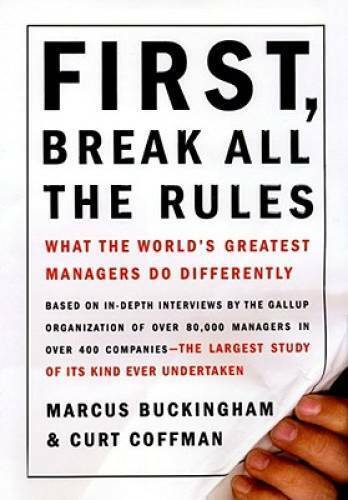First, Break All the Rules illustrates unconventional insights gleaned from extensive research on the best management practices. Effective managers help their employees become more of who they already are by capitalizing on their unique talents. Marcus and Curt explain that talent is a recurring pattern of thought, feeling, or behavior that can be productively applied. Unlike skills and knowledge, talents are largely unteachable because they represent our natural predispositions. Great managers match their employees’ talents to an ideal role and then help build skills and knowledge around that.
Great leadership involves looking outward to bring strategy and capabilities together cohesively. In contrast, the best management practices involve focusing inward on individual employees and how to leverage their unique traits for optimal performance. To do so, managers should focus on defining the right outcome, not the steps to get there. Employees should feel the tension to achieve and be empowered to do so. This book has helped me focus to leverage my team’s unique talents and on giving them objectives that they are well-equipped but challenged to accomplish.
You should read this book if you…
- want to improve how you manage your team
- are interesting in improving your hiring by focusing on talent over skills and knowledge
- seek strategies on how to develop employees
Additional Information
Year Published: 1999
Book Ranking (from 1-10): 9 – Excellent – Broad and very well articulated insights
Ease of Read (from 1-5): 3 – Average
Key Highlights
- GALLUP: Do you have a secret to building great teams? MICHAEL: No, I don’t think there is a secret. I think the best a manager can do is to make each person comfortable with who they are. Look, we all have insecurities. Wouldn’t it be great if, at work, we didn’t have to confront our insecurities all the time?
- Great managers reject this out of hand. They remember what the frog forgot: that each individual, like the scorpion, is true to his unique nature. They recognize that each person is motivated differently, that each person has his own way of thinking and his own style of relating to others. They know that there is a limit to how much remolding they can do to someone. But they don’t bemoan these differences and try to grind them down. Instead they capitalize on them. They try to help each person become more and more of who he already is
- The most important difference between a great manager and a great leader is one of focus. Great managers look inward. They look inside the company, into each individual, into the differences in style, goals, needs, and motivation of each person. These differences are small, subtle, but great managers need to pay attention to them. These subtle differences guide them toward the right way to release each person’s unique talents into performance. Great leaders, by contrast, look outward. They look out at the competition, out at the future, out at alternative routes forward. They focus on broad patterns, finding connections, cracks, and then press home their advantage where the resistance is weakest. They must be visionaries, strategic thinkers, activators. When played well, this is, without doubt, a critical role. But it doesn’t have much to do with the challenge of turning one individual’s talents into performance
- Instead they define a talent as “a recurring pattern of thought, feeling, or behavior that can be productively applied.” The emphasis here is on the word “recurring.” Your talents, they say, are the behaviors you find yourself doing often
- Of course, this doesn’t mean that you cannot change some of your behaviors. You can. Over time, through reflection, you might change your values and so learn a more positive and productive way to apply your talents. You might choose to play to one talent more than another. You might combine your talents with relevant skills. You might learn to accept your unique combination of talents and so become less defensive or insecure. There is a great deal you can change. But whatever you do, the beauty of this approach is that it relies on self-awareness, rather than self-denial, to help you become more effective
- The solution is as elegant as it is efficient: Define the right outcomes and then let each person find his own route toward those outcomes
- Level 1: At the lowest level, customers expect accuracy. Level 2: The next level is availability. Level 3: At this level customers expect partnership. They want you to listen to them, to be responsive to them, to make them feel they are on the same side of the fence as you. Level 4: The most advanced level of customer expectation is advice. Customers feel the closest bond to organizations that have helped them learn
- Don’t use average to estimate the limits of excellence. You will drastically underestimate what is possible. Focus on your best performers and keep pushing them toward the right-hand edge of the bell curve. It is counterintuitive, but top performers have the most potential for growth
- Create heroes in every role. Make every role, performed at excellence, a respected profession. Many employees will still choose to climb the conventional ladder, and for those with the talent to manage others or to lead, this will be the right choice. However, guided by meaty incentives, many other employees will decide to redirect their energies toward growth within their current role
- This is a cardinal sin of interviewing. Regardless of the detail the candidate eventually provided, if she needed two or three probes to describe a specific example, then the chances are that the behavior in question is not a recurring part of her life. When you ask “Tell me about a time” questions, don’t judge the response on the quality of its detail. If you do, you will end up evaluating whether the person is articulate or whether the person has a good memory, rather than whether he or she has the particular recurring talent you want. Instead, judge the response on whether it was specific and top of mind
- Recent research into adult learning reveals that students stay in school longer and learn more if they are expected to direct and record their progress. Great managers realized this long ago and now apply it with their employees

Discover more from The Broader Application
Subscribe to get the latest posts sent to your email.
